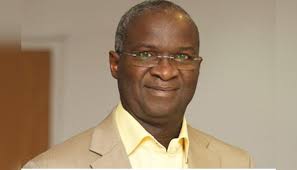The Federal Government has assured that the newly completed Joint border bridge in Ikom, Cross River state will facilitate a strong relationship with Cameroon, improve joint border patrol, and increase trade and prosperity among Nigerians.
Minister of Works and Housing, Babatunde Fashola stated this while inspecting the bridge and pledged to inform President Muhammadu Buhari about the completion of the massive infrastructure for commissioning.
Members of the host community also expressed excitement over the completed bridge with hopes that it will help to bring about peace and security in the area. The Chairman of Etung Local Government Area, Henry Etuk said his people were happy and thanked the Federal Government for completing the project.
A community leader, Mr. Victor Njorogar added his voice to the commendation of President Muhammadu Buhari’s administration for building the bridge, saying that it would strengthen joint border patrol so that lives and properties can be protected.
The 1.5 km long Joint Border Bridge costing 38 million dollars was executed under the auspices of the Road Sector Development Team (RSDT) in the Ministry of Works headed by Engineer Ishaq Mohammed. The bridge is part and the final leg of the Enugu-Abakaliki-Ogoja Junction-Mfum-Ikom road project constructed by the RSDT.
The about 130-kilometer stretch road project was hailed as one of the star roads in Nigeria and constructed in less than two years. The road terminates at the border bridge in Ikom but the existing metal bridge had collapsed, having been in use for over 60 years and therefore could not facilitate movement between Nigeria and Cameroun for a long time.
With the construction of a modern bridge, the road has given respite to international businesses and social interaction between Nigerians and Cameroonians.
Fashola added that President Buhari’s administration planned to renew and expand old infrastructure and take the two countries to the future for many more decades, strengthening the relationship between them.
“We have had a strong relationship with the Republic of Cameroon in terms of trade and business.
“If you go to Aba, Enugu, and Abakaliki for example, I can tell you that they are on the route that facilitates trade in agro-produce, merchandise, and manufactured goods from Aba in Abia state.
“Nigeria is now a signatory to the Africa Continental Free Trade Agreement. So this is the infrastructure that positions both nations to take the benefit of the trade that the agreement holds. It is really exciting. Looking into the future you can only see more business, more trade, and employment meant for people,” Fashola said.
The minister added that the bridge was a social asset and that the happiness and prosperity of Nigerians was enough payment saying that “these are social assets and we must understand that the recoupment is the happiness and the prosperity of the people of Nigeria.
“For as long as our people are happy, they can travel easily, they can reduce their journey, safe time on the road because if you save time you save money, and am sure the President is delighted,” he added.
The Joint Border Bridge is one of the projects under the Transport Facilitation Programme for the Bamenda-Enugu Corridor otherwise known as the Nigeria/Cameroon Multinational Highway and Transport Facilitation Programme.
Following the International Court of Justice judgment of 10th October 2002 on the Bakassi Peninsula border dispute between Nigeria and Cameroon, a tripartite summit was held in Geneva in November 2002 between the then Nigerian President Olusegun Obasanjo, President Paul Biya of Cameroon, and Mr. Kofi Annan, the then United Nations Secretary-General.

